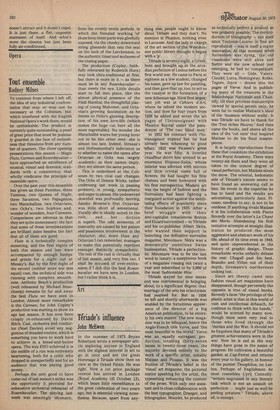Opera
Tout ensemble
Rodney Milnes
To continue from where I left off, the idea of any industrial confron tation that may or may not be necessary at the Coliseum, but which interfered with the English National Opera's work there, would be unthinkable. The product is currently quite outstanding, a pearl of great price that must be jealously guarded in the face of swinishness that threatens from any number of quarters. The three opening presentations this season — Magic Flute, Carmen and Rosenkavalier — have approached an excellence of musical, visual and dramatic standards with a consistency that wholly vindicates the principle of ensemble opera.
Over the past year this ensemble has given us three Paminas, three Taminos, two Queens of Night, three Sarastros, two Papagenosi two Marschailins, two Octavians, two Ochs's, two Sophies and, wonder of wonders, four Carmens. Comparisons are odorous in that they are quite unnecessary: the fact that some of these interpretations are brilliant pales besides the fact that all of them are good.
Flute is a technically complex mounting, and the first nights of both this season and last were accompanied by enough bumps and grinds for a night out at Minsky's. But by the first night of the second (neither more nor less equal) cast, the technical side was running with complete smoothness. Anthony Besch's production (well rehearsed by Michael Beauchamp) remains by far and away the best Flute we have seen in London. Almost more remarkable is the Carmen, for John Copley's production was starting to show its age last season. It has now been crisply re-rehearsed by David Ritch. Cast, orchestra and conductor (Noel Davies) avoid any suggestion of dreaded routine, which is something you have to work hard to achieve in a bread-and-butter opera. The way ENO achieved it in the middle of a run was extremely heartening, both for a critic who dropped in unexpectedly and for an audience that was paying good money.
Perhaps the only good to have come out of last season's strike was the opportunity it provided for exhaustive orchestral rehearsal of Rosenkavalier. The playing last week was amazingly idiomatic, from the overtly erotic prelude, in which the frenzied working of those busy inner parts was gleefully exposed, via the cheeky downward string glissando that sets the seal on the luck of the Lerchenaus, to the authentic tinsel and molasses of the closing pages.
The production (Copley, faithfully rehearsed by Roderick Horn) may look ultra-traditional at first, but there is more in it — as there must be in any Rosenkavalier — than meets the eye. Little details start to fall into place, like the almost physical presence of the Field Marshal, the thoughtful placing of young Mahomet, and Octavian's growing fascination as he listens to Ochs's glowing description of his own love-life (which makes the huge cut here all the more regrettable). No wonder the Marschallin warns her young lover not to be like other men: she is almost too late. Indeed, Strauss's and Hofmannsthal's indecision as to whether to name the opera after Octavian or Ochs was largely academic: as their names imply, they are almost the same person.
This is underlined at the Coliseum by two vital cast changes. The Ochs of Dennis Wicks, rather undersung last week (a passing problem), is young, sympathetic and eager to please. His undeserved downfall was profoundly moving, Sandra Browne'e first Octavian was little short of sensational. Vocally she is ideally suited to the
role, and her diction is superb. The odd moments of insecurity are caused by her patent and passionate involvement in the character; she, more than any Octavian 1 can remember, manages to make this potentially repellent teenager distinctly sympathetic. The rest of the cast is virtually that of last season, and very fine too. I shall be accused of over-enthusiasm if I dub this the best Rosenkavalier we have seen in London, but 1 rather think it is.


































 Previous page
Previous page